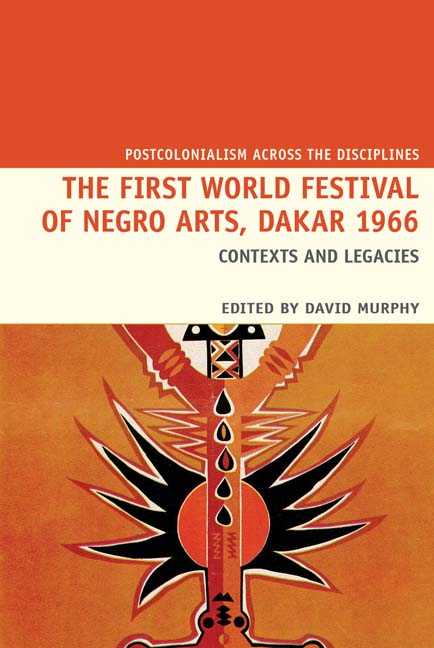Book contents
- Frontmatter
- Contents
- Acknowledgements
- List of Figures
- Notes on Contributors
- Introduction. The Performance of Pan-Africanism: Staging the African Renaissance at the First World Festival of Negro Arts
- I Contexts
- 1 ‘The Real Heart of the Festival’: The Exhibition of L'Art nègre at the Musée Dynamique
- 2 Dance at the 1966 World Festival of Negro Arts: Of ‘Fabulous Dancers’ and Negritude Undermined
- 3 Staging Culture: Senghor, Malraux and the Theatre Programme at the First World Festival of Negro Arts
- 4 Making History: Performances of the Past at the 1966 World Festival of Negro Arts
- 5 ‘The Next Best Thing to Being There’: Covering the 1966 Dakar Festival and its Legacy in Black Popular Magazines
- II Legacies
- Books and Films about the 1966 Festival
- Bibliography
- Index
4 - Making History: Performances of the Past at the 1966 World Festival of Negro Arts
from I - Contexts
- Frontmatter
- Contents
- Acknowledgements
- List of Figures
- Notes on Contributors
- Introduction. The Performance of Pan-Africanism: Staging the African Renaissance at the First World Festival of Negro Arts
- I Contexts
- 1 ‘The Real Heart of the Festival’: The Exhibition of L'Art nègre at the Musée Dynamique
- 2 Dance at the 1966 World Festival of Negro Arts: Of ‘Fabulous Dancers’ and Negritude Undermined
- 3 Staging Culture: Senghor, Malraux and the Theatre Programme at the First World Festival of Negro Arts
- 4 Making History: Performances of the Past at the 1966 World Festival of Negro Arts
- 5 ‘The Next Best Thing to Being There’: Covering the 1966 Dakar Festival and its Legacy in Black Popular Magazines
- II Legacies
- Books and Films about the 1966 Festival
- Bibliography
- Index
Summary
‘Nous voici donc dans l'histoire’ [So here we are: part of history], declared French Minister of Culture, André Malraux (1966b) in his speech at the conference that opened the 1966 World Festival of Negro Arts. This was, he claimed, the first time that an African head of state had held the continent's future in his hands. Later at the same conference, Aimé Césaire warned the audience that ‘l'histoire est toujours dangereuse. Si l'on n'y prend garde, l'Afrique risque de ne plus se voir que par les yeux des autres’ [History is always dangerous. If we are not careful, Africa risks only seeing itself through the eyes of others] (Césaire 2009: 211). From their distinct standpoints, both men conceive of history as an urgent participatory activity, a subjective force for change and, in Césaire's case, a perennial threat in post-independence Africa. Drawing on contemporary press coverage and archival documents, this chapter explores ideas of history and historical change as manifested in three performances in 1966 based on scripts by Amadou Cissé Dia, Jean Brierre and Wole Soyinka. These performances staged frictions between notions of pan-African past(s), present(s) and future(s) in the lived context of Dakar's urban fabric. In doing so, they also generated a tangible, often celebratory, sense of collective belonging and history-making across social strata.
History—the ‘accounts of how things change over time’ (Hunt 2008: 5)— was a central source of energy and tension in 1966. Did the festival seek primarily to showcase artistic production of the past (as in the museum exhibitions or folkloric dance shows) or to propose a future-oriented, transformative experience? How might these two tasks be intertwined? And how would such apparently abstract questions, long debated in the pages of journals such as Présence Africaine, play out in the material contexts of the Dakar festival? In making its own social form of history, the festival marked a decisive shift from the spaces of conference panels and round tables, and the dense columns of intellectual journals, to experiential modes of cultural exchange on an unprecedented scale.
During the period of decolonization certain historical narrative devices, including those of linear, teleological progress and a guiding historical subject, came under increasing pressure.
- Type
- Chapter
- Information
- The First World Festival of Negro Arts, Dakar 1966Contexts and legacies, pp. 107 - 122Publisher: Liverpool University PressPrint publication year: 2016



